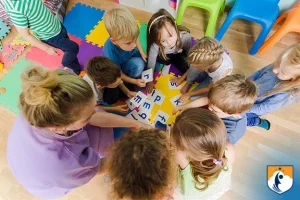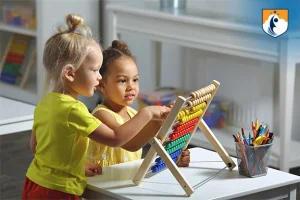
Daycare vs. Preschool: Understanding the Difference and Why It Matters for Your Child
What’s the difference between daycare and preschool? Does it matter which one I choose? As parents, we are faced with countless decisions that shape our child’s early years. One of the most significant choices is selecting the right type of care and education for our little one.
Let’s take a closer look at the distinctions between these two options and explore why preschool offers unique advantages that can have a lasting impact on your child’s development.
Daycare and Preschool: Similarities

At a glance, daycare and preschool may seem quite similar. Both often operate during convenient hours, such as 7 a.m. to 6 p.m., making them accessible to working families. Many programs offer full-day or half-day options, and both adhere to government regulations regarding safety, food preparation, and child-to-staff ratios.
In both settings, children receive nurturing care, opportunities for play, and a safe environment where their needs are met. However, the key differences lie in their approach to learning and development.
Daycare: Meeting Basic Needs with a Flexible Approach
Daycare is primarily focused on providing supervision and meeting children’s immediate needs. While there may be opportunities for play and some structured activities, the focus is less on education and more on providing a safe space for children.
- Mixed Age Groups: Daycares often group children of various ages together, which can foster sibling-like relationships but may not always align with each child’s specific developmental needs.
- Flexible Curriculum: Many daycares do not implement a formal curriculum, which means activities may not consistently target all developmental domains.
- Focus on Supervision: The emphasis is on ensuring children are cared for while parents are at work, with less attention given to fostering academic or developmental milestones.
For families looking for a place where their child can be safely cared for while maintaining a flexible schedule, daycare is a helpful solution.
Preschool: A Focus on Learning and Development
 Preschool, on the other hand, is intentionally designed to support children’s developmental milestones through structured learning, play, and exploration. Whether you choose a Montessori, Reggio Emilia, or another preschool approach, these programs offer significant benefits for your child’s cognitive, emotional, and social growth.
Preschool, on the other hand, is intentionally designed to support children’s developmental milestones through structured learning, play, and exploration. Whether you choose a Montessori, Reggio Emilia, or another preschool approach, these programs offer significant benefits for your child’s cognitive, emotional, and social growth.
- Educational Foundation: Schools follow a developmentally appropriate curriculum that targets early literacy, numeracy, and social skills. These structured activities prepare children for elementary school.
- Age-Specific Groups: Children are grouped by age, like Westcliff Early Learning Academy’s toddler, preschool programs, which ensure that learning activities are tailored to their developmental stage and fostering peer relationships that promote social growth.
- Long-Term Benefits: Studies show that children who attend preschools, especially those with robust pedagogies like Montessori or Reggio Emilia, achieve higher rates of academic and social success. They tend to excel in reading, vocabulary, and numerical understanding as they progress into elementary school. A study found that adults who attended a Montessori school for two years during early childhood had higher levels of psychological well being. Frontiers | Montessori Preschool Elevates and Equalizes Child Outcomes: A Longitudinal Study
The Science Behind Early Childhood Education
 Why does preschool make such a difference? It all comes down to brain development.
Why does preschool make such a difference? It all comes down to brain development.
The first five years of life are a period of extraordinary brain growth, with the brain reaching 90 percent of its adult size by age five. During this time, millions of neural connections are forming every second. Positive interactions with caregivers play a crucial role in shaping these connections.
Here are some important ways preschools foster this critical development:
- Connective Interactions: These back-and-forth exchanges between caregivers and children—whether through conversation, expressions, or play—build strong neural pathways and promote social-emotional learning.
- Physical Affection: Touch and affection release growth hormones, supporting a child’s emotional well-being and brain development.
- Learning Through Observation: Babies and toddlers naturally learn by observing their caregivers, following their gaze, and mimicking their actions. Preschool teachers are trained to leverage this instinct for learning.
While daycare can meet your child’s basic needs, a preschool, such as Westcliff Early Learning Academy in Irvine, California, provides an environment that is intentionally designed to nurture the whole child. From academic readiness to emotional resilience, the benefits of a preschool education lay the foundation for a lifetime of learning and success.
Of course, every family’s needs and priorities are different, and the decision ultimately depends on what’s best for your child and your circumstances. As you consider your options, remember this: the first five years of your child’s life are a window of opportunity to provide experiences that will shape their future. Whether near or far, this choice matters deeply, and Westcliff Early Learning Academy is here to help guide you every step of the way.

